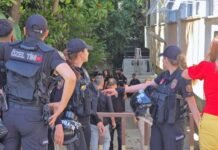A former academic at Ankara University’s Faculty of Law, who was dismissed from duty by Turkish government’s executive decree under the rule of emergency declared in the aftermath of a controversial coup attempt on July 15, 2016, is planning to return to his university as student.
It was reported that academic Dr. Cenk Yiğiter has passed the university entrance exam and has deserved to register as an undergraduate student of journalism at the same university where he was a professor until he was arbitrarily dismissed by a government decree.
“Entering the Cebeci [campus of Ankara University] again will give me happiness, but it will also sadden me as many academics have been expelled and the university has lost its qualification as a ‘university,’” Dr. Cenk Yiğiter said in his personal Twitter account.
Dr. Yiğiter was expelled from the university by a government decree on January 6, 2016 since he was among the academics who signed the Academics for Peace petition which criticized security operations in the southeast Anatolia.
Yiğiter also tweeted to Pro-Erdoğan and partisan Ankara University Rector Erkan İbiş after learning he would be reentering the university as a student. “I have learned the result of my LYS [national university exam] Mr. @profdrErkanibis. It has become definite that I will be a student of the İLEF [faculty of communication]. How are the preparations going?” he tweeted on July 11.
He continued to post his messages on Twitter by writing that “@profdrErkanibis opened six investigations against me while I was an academic. How many investigations will he launch while I’m a student in the first year, let me take estimations.”
A total of 23,427 academics have been affected by a state of emergency (OHAL) that was declared following a controversial military coup attempt on July 15, 2016, BBC Turkish reported on July 11, 2017. According to the report, at least 23,427 academics either lost their jobs at universities when their contracts were terminated or were dismissed from their positions, or the universities where they worked were closed down by the government after Sept. 1, 2016.
Emergency rule was declared for three months on July 21, 2016 and became effective with a government decree issued on July 23, 2016. With the first decree, No. 667, 15 universities were closed down on the grounds that they were linked to the faith-based Gülen movement, accused by the Turkish government of leading the failed coup, a claim the movement denies.
There is no information about the number of administrative staff members working at these universities who were affected, but 2,808 academics were left unemployed and 65,000 students had to seek new universities according to figures from Turkey’s Council of Higher Education (YÖK).
Six state decrees issued in one year caused the dismissal of 5,247 academics from 117 universities. Critics say the collective dismissal of academics and collective verdicts without specifying individual crimes violates the principle of “the individuality of crime and punishment in law.”
According to a study conducted by the Freedom For Academia, the Justice and Development Party (AKP) government under the strict rule of Turkey’s autocratic President Recep Tayyip Erdoğan has sacked more than 8,000 critical academics and led to 28 percent decrease in academic output since the failed coup attempt on July 15, 2016.
However, a report issued in March 2017 by Turkey’s main opposition Republican People’s Party (CHP) has claimed that 4,811 academics have been dismissed from 112 universities across the country through decrees issued during a state of emergency declared after the failed coup attempt.
July 13, 2017















